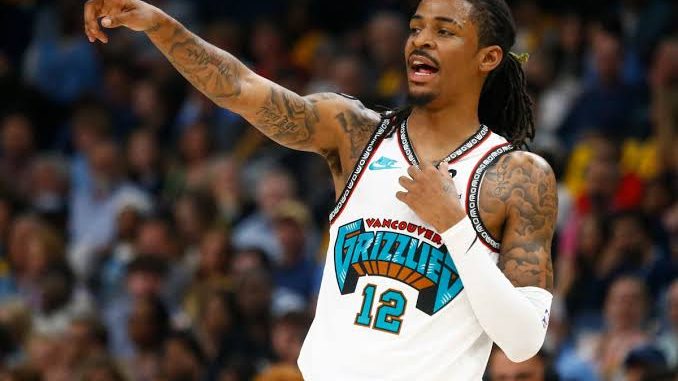
Memphis, TN – Memphis Grizzlies electrifying point guard Ja Morant, a cornerstone of the team’s success and a fan favorite, is reportedly laying down some unconventional terms as he approaches the end of his current five-year contract. Sources close to the situation suggest that Morant has communicated his desired terms for a potential contract extension to the Grizzlies organization, including a policy that would see him absent from paying federal and local income taxes on his salary, with the team allegedly tasked with handling these tax obligations without impacting his stated contract earnings.
While Morant’s current contract has him locked in for the coming seasons, the buzz around potential future deals and his long-term commitment to Memphis is already a hot topic. Morant, known for his spectacular athleticism and fearless play, has become the face of the Grizzlies franchise and a player the team is undoubtedly keen to retain for the foreseeable future. However, this reported request regarding his tax responsibilities introduces a unique and potentially complex dynamic into any future contract negotiations.

Typically, professional athletes in the United States, like most working individuals, are responsible for paying their own federal, state, and local income taxes. Teams, acting as employers, are obligated to withhold the appropriate tax amounts from player salaries and remit them to the relevant government authorities. Players then file their individual tax returns to reconcile their income and withholdings at the end of the tax year. Additionally, due to the nature of professional sports, athletes are also subject to the “jock tax,” meaning they often have to pay income taxes in states and cities where they play road games.
Morant’s reported stance would seemingly shift this standard practice, essentially asking the Grizzlies to cover his federal and local income tax liabilities as part of his compensation, without reducing his stated contract salary. This would represent a significant additional cost for the team, over and above his already substantial playing salary.
The feasibility and legality of such an arrangement are immediately brought into question. U.S. tax laws generally hold individuals responsible for their own income taxes. While employers can certainly provide financial benefits and bonuses to employees, directly exempting them from paying federal and local income taxes and having the employer shoulder that burden is highly unusual and could face scrutiny from tax authorities.
Moreover, the NBA’s collective bargaining agreement (CBA) and salary cap regulations would also play a crucial role in determining the viability of such a request. Teams operate under strict salary cap restrictions designed to ensure competitive balance within the league. Any compensation provided to a player, including the assumption of their tax liabilities, could potentially be factored into these cap calculations. This would mean that the team covering Morant’s taxes might limit their ability to sign other players or offer competitive contracts in the future.
While teams often work creatively within the bounds of the CBA to attract and retain star players, a request of this nature would likely require careful consideration of its legality and its impact on the team’s overall financial structure and salary cap flexibility. It remains to be seen how the Grizzlies organization will respond to such a bold proposition from their franchise player.
This development undoubtedly adds an intriguing layer to the future of Ja Morant in Memphis. His desire to remain with the Grizzlies is clear in his commitment to negotiate terms for a future contract. However, the specific nature of this reported tax policy introduces a level of complexity that is not typically seen in professional sports contract negotiations.
Whether the Grizzlies and Morant can find a mutually agreeable solution that addresses both his desire to stay and the team’s financial and legal obligations remains a significant question for the future of the franchise.
Be the first to comment